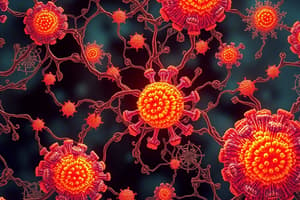Podcast
Questions and Answers
What is the primary focus of studying drugs in biology?
What is the primary focus of studying drugs in biology?
- Studying the cultural impact of drugs on society
- Exploring the historical uses of different drugs
- Investigating the psychological effects of drugs on individuals
- Understanding how drugs interact with cells, tissues, organs, and whole bodies (correct)
What is the main function of hormones in the body?
What is the main function of hormones in the body?
- Serving as building blocks for the body's structure
- Causing immediate physical responses to stimuli
- Stimulating the sensation of pain
- Regulating bodily processes such as growth, development, metabolism, and reproduction (correct)
In biology, what is the significance of studying the eye?
In biology, what is the significance of studying the eye?
- Understanding vision and its importance in daily life (correct)
- Exploring cosmetic procedures for eye enhancement
- Investigating methods to improve hearing abilities
- Analyzing the effects of different tastes on the tongue
What aspect of biology focuses on hormonal dysregulation and its impact on health?
What aspect of biology focuses on hormonal dysregulation and its impact on health?
How do hormones influence metabolic processes in the body?
How do hormones influence metabolic processes in the body?
Which organ system is primarily responsible for transmitting information as electrical signals in the body?
Which organ system is primarily responsible for transmitting information as electrical signals in the body?
What is the main function of the eye component known as the retina?
What is the main function of the eye component known as the retina?
Which part of the nervous system is responsible for regulating involuntary functions like heartbeat and digestion?
Which part of the nervous system is responsible for regulating involuntary functions like heartbeat and digestion?
In the nervous system, what role do neurotransmitters play?
In the nervous system, what role do neurotransmitters play?
How does the cornea contribute to visual health?
How does the cornea contribute to visual health?
Which of the following is NOT a part of the central nervous system (CNS)?
Which of the following is NOT a part of the central nervous system (CNS)?
What is the primary function of hormones in the body?
What is the primary function of hormones in the body?
Study Notes
Biology: Exploring Drugs, Hormones, Eye, and Nervous System
Overview
The field of biology covers a diverse range of subjects, including drugs, hormones, the eye, and the nervous system. These areas are integral to understanding the human body and its functions. In this article, we delve into each of these topics to provide a comprehensive overview.
Drugs
Biology involves studying various types of drugs and their effects on living organisms. It examines how drugs interact with cells, tissues, organs, and whole bodies. This includes understanding drug mechanisms, dosages, side effects, and the therapeutic potential of various compounds. Studies in this area can lead to advances in pharmaceuticals, medical treatments, and health care delivery.
Hormones
Hormones are chemical signals produced by glands and organs in the endocrine system. They play a crucial role in regulating bodily processes such as growth, development, metabolism, reproduction, and immune function. The study of hormones in biology involves understanding their synthesis, secretion, transport, and action. Research in this area contributes to the diagnosis and treatment of hormone-related disorders and diseases.
Eye
The eye is a vital sensory organ responsible for vision. Its structure and function are central to optometry and ophthalmology, branches of medicine concerned with eyes and visual systems. Biology explores the structure and physiology of the eye, including its components such as the cornea, iris, pupil, lens, retina, choroid, vitreous humor, sclera, conjunctiva, and optic nerve. Understanding these aspects is crucial for detecting and treating eye conditions and maintaining optimal visual health.
Nervous System
The nervous system controls all functions of the body through communication between the brain and other parts of the body. It consists of the central nervous system (CNS) and the peripheral nervous system (PNS). The CNS comprises the brain and spinal cord, while the PNS includes cranial nerves, spinal nerves, autonomic nerves, and ganglia.
Studying the nervous system in biology involves understanding how neurons transmit electrical impulses, how synapses facilitate communication between neurons, and how neurotransmitters modulate neural activity. This knowledge is essential for diagnosing and managing neurological disorders, injuries, and degenerative diseases affecting the nervous system.
In conclusion, biology offers valuable insights into the complex systems and processes that govern our bodies, enabling us to develop a deeper understanding of ourselves and the natural world around us. By exploring topics such as drugs, hormones, the eye, and the nervous system, we can unlock the mysteries of life and pave the way for advancements in healthcare, agriculture, environmental conservation, and beyond.
Studying That Suits You
Use AI to generate personalized quizzes and flashcards to suit your learning preferences.
Description
Test your knowledge on drugs, hormones, the eye, and the nervous system in biology with this comprehensive quiz. Explore how drugs interact with living organisms, the role of hormones in regulating bodily processes, the structure and function of the eye, and the complexities of the nervous system.




